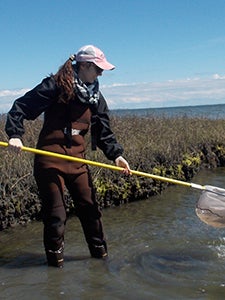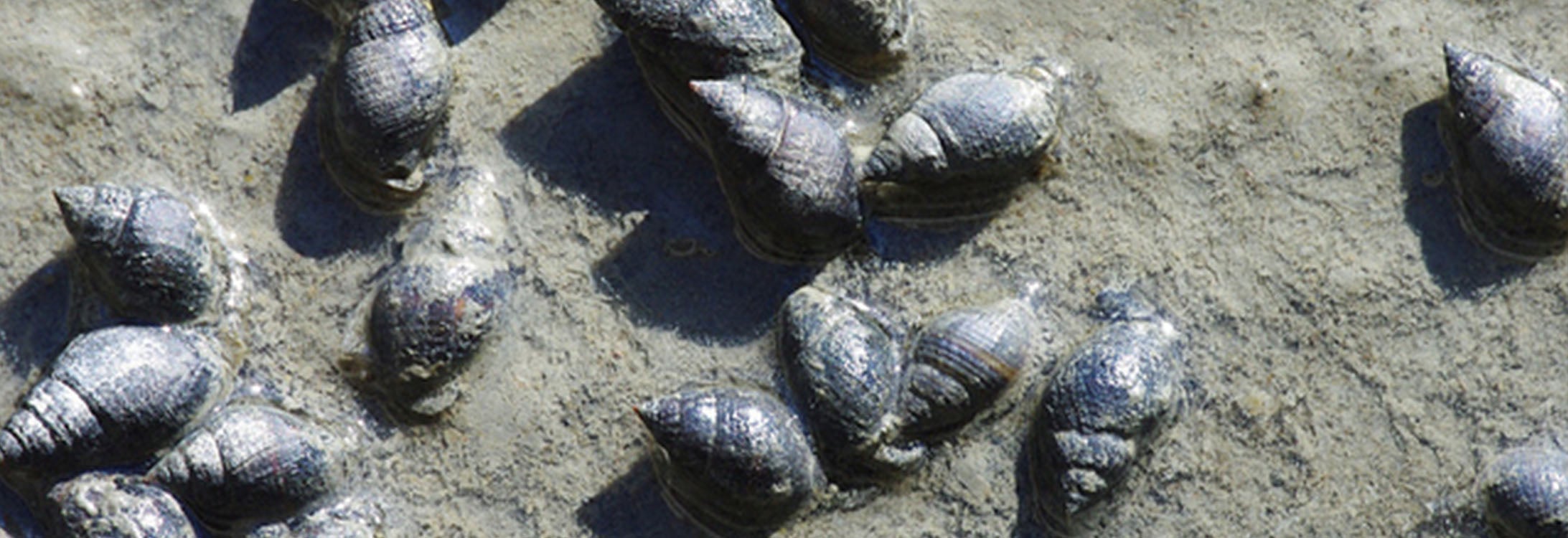Student Profile: Emily Edmonds

Undergraduate researcher Emily Edmonds is researching biodiversity along shorelines to better understand coastal ecosystems.
Major: Biology
Mentor: Dr. April Blakeslee
Department: Biology
Project Title: “Parasites as indicators of biodiversity in coastal shoreline habitats”
My research will show how hardened shorelines, like bulkheads, influence the biodiversity in a habitat by studying parasitized mudsnails collected from both “natural” sites and “bulkhead” sites. There is a strong correlation between parasites and their hosts, so if the parasites are found, then their specific downstream hosts are present. It can be challenging and time-consuming to survey for overall biodiversity, but measuring parasite diversity provides an efficient way to gain an understanding of what other hosts are present in the area.
How did you get involved in undergraduate research?
I attended the ECU EXCELS program my freshman year and met Dr. April Blakeslee. She told me all about her lab and encouraged me to pursue undergraduate research. I quickly became part of the lab family and they have been helping me achieve my goals ever since.
Why did you choose your research topic?
A lot of the projects in Dr. Blakeslee’s lab use the parasites in mudsnails to answer broad questions about ecosystems because they are a common first host for trematodes (parasitic flatworms). Dr. Blakeslee, Christopher Moore and myself put together this idea partly because we had already been working on a project in Beaufort, N.C. It was a convenient location where we had already collected some data on parasites.
What’s been your favorite part of conducting undergraduate research?
My favorite part has definitely been going sampling. We have the best time going out in the field and collecting the mudsnails to bring back to the lab. Everyone in our lab is amazing, so it’s always a fun day (even that time I fell backwards straight into the muck – thank goodness for waders).
What challenges have you faced while conducting undergraduate research?
It is a true time commitment because I’ve simply got to spend hours in the lab in order to dissect all the snails that are collected. It is extremely rewarding when the data starts to come together, but until that point, it mainly consists of sitting at the microscope and recording what I find, which can also be exciting at times!
Why is your research important for the average, everyday person?
My research will show us what shoreline hardening is doing to the biodiversity in that area. Everyone who lives or has been around the coast has seen bulkheads, and I think it should be important to everyone to see what exactly this “hardening” is doing to the organisms that live there compared to a natural shoreline.
What’s your ultimate goal or accomplishment that you hope your research will help you achieve?
Receiving an URCA award and presenting at a conference, both of which I was able to do thanks to the support from my lab members, were accomplishments that I will be forever proud of. Eventually, I’m hoping that everything I have learned through sampling, dissecting, and analyzing data will help me achieve my ultimate goal of getting into vet school.
How do you feel that participating in undergraduate research has helped prepare you for life after college?
Being an undergraduate researcher has helped me become more comfortable in professional settings, as well as more inclined to do things that I’ve never even thought of doing. Dr. Blakeslee has been extremely helpful by encouraging me to step out of my comfort zone, and by doing so I have achieved things I never believed to be possible in my undergraduate years at ECU. I started in her lab as a freshman, and as a senior I can confidently say that I will always be grateful for the experiences and the knowledge I will be taking away from my undergraduate research opportunity.
Do you have any advice for other students interested in conducting undergraduate research?
Reach out to your professors, or even faculty members who aren’t your professors! There are so many opportunities for undergraduates to get experience in research, but you have to reach out in order to take advantage of those opportunities.
